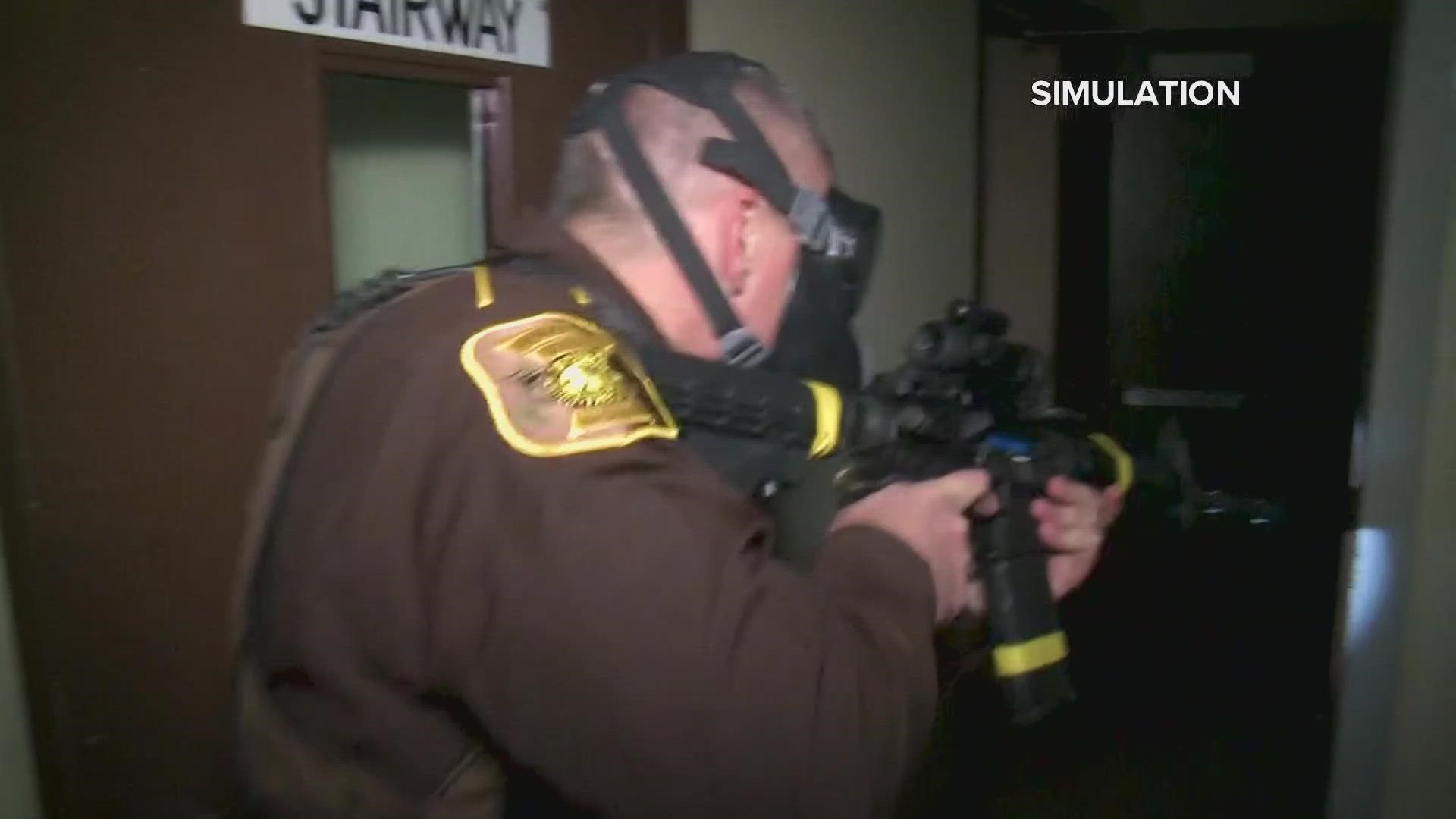MAINE, Maine — Law enforcement officers nationwide have faced increased scrutiny on how they respond to active shooters after the attack in Uvalde, Texas, where a gunman killed 19 students and two teachers in May 2022.
A report from Texas State University's Advanced Law Enforcement Rapid Response Training Center (ALERRT) found it took responding officers 71 minutes to stop the shooter.
Deputies with the Cumberland County Sheriff's Office train in realistic simulations at least yearly where they respond to an actor posing as an active shooter and stop that threat.
In these trainings, deputies and the actors use what's called "simunition" weapons: nonlethal training ammunition they load into realistic firearms so they can prepare to run toward the sounds of screams and gunshots and potentially pull the trigger.
"I come to school with the mindset every day that today's going to be the day," Deputy Todd Meslin said.
Meslin is the school resource officer for MSAD 15 in the Gray-New Gloucester area.
"I look at those kids as being my own," Meslin said. "I'm their dad when they're at school five days a week. I'm 100 percent committed to keeping my school safe."
The hoax calls about an active shooter at Sanford High School and several other schools on Nov. 15, 2022, made a lot of students worry about what a real active shooter situation would look like.
"They come tell me about it," Meslin said. "They go to school with it always in the back of their minds that something bad could happen at any given moment. I've had lots of kids come up to me like, 'Are you going to take care of us?' And I say, 'Absolutely, that's what I'm here for.'"
That worry comes from intense public scrutiny of how law enforcement responded to the shooting at Robb Elementary School in Uvalde, Texas.
An 18-year-old gunman got inside the school and killed 19 students and two teachers.
The sheriff's department uses the report on the Uvalde shooting as an example of what they must and must not do when lives are at stake.
"I was honestly heartbroken, because I'd like to think that that's not what I would do in that situation," Deputy Chuck Sawyer, a former U.S. Army Airborne Ranger, said. "But out of respect to them, people don't know how they're going to respond to a stressful situation until they're put in a stressful situation."
Sheriff Kevin Joyce invited NEWS CENTER Maine to participate in the training and experience what it takes to find and stop a person with a gun.
"We're trying to inject stress into this scenario as much as possible," Sgt. Marc Marion said. "We find police officers not trained under stress will not react when they're put under stress [in the real world]."
"If you practice stuff enough times, then when it actually happens to you, you don't think, you just respond," Sawyer said. "It's 2022. We've been going through this for the last 20, 21 years. It's only getting worse. The one thing that's the constant with every one of these horrible things is that people said they didn't think it could happen here."
Maine's Criminal Justice Academy does not require school resource officers to participate in active shooter simulation training as part of its curriculum, but assistant director Jack Peck told NEWS CENTER Maine that departments that employ officers may require it.
Peck said the state plans to expand its yearly school resource officer certification course, which started in 2021, from 40 hours to 80 hours. He said both officers and instructors asked to increase the training involved. Eighteen officers took that inaugural class in 2021. Twenty-three participated in 2022.
Prior to that course, Maine did not offer an SRO certification course, and officers had to go through the National Association of School Resource Officers.
Joyce called the simulation training critical for his staff, even though Maine has never experienced a mass shooting. He started this training more than 10 years ago.
"We're lucky, but we're not immune," Joyce said. "We're not immune at all. We have the same components that all these other places had, we're just a lot lucky in my opinion."
"It's scary. It's something I think about every single day, and I think that's good. Being mentally prepared to handle a situation, like worse-case scenario, is something I have to do to make sure I perform the way I'm supposed to perform," Meslin said. "It's real. I walk out of here every day thankful that nothing bad happened."

